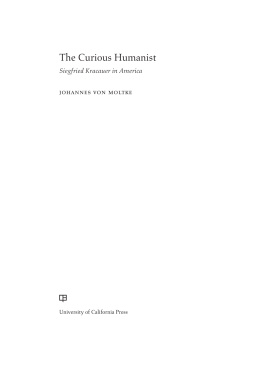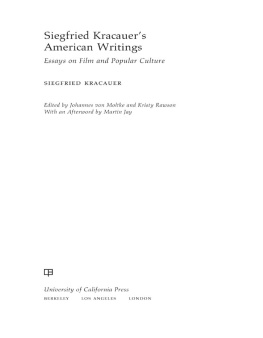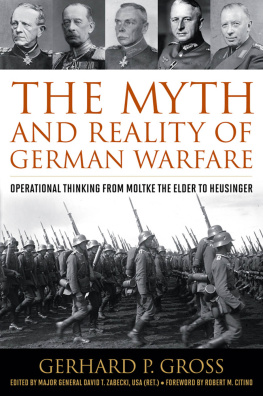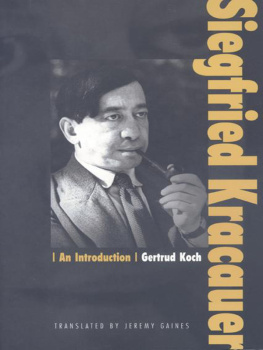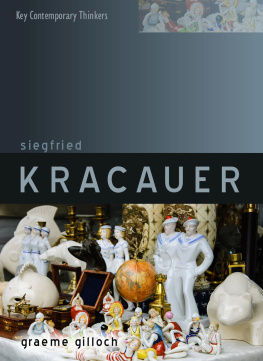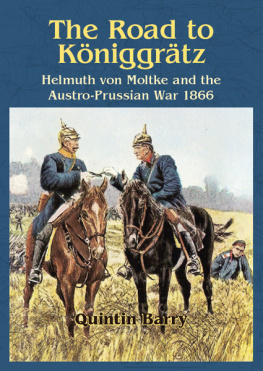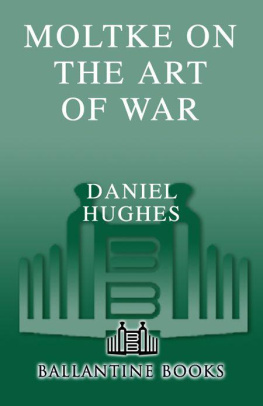Acknowledgments
Shortly before leaving Germany in 1933, Siegfried Kracauer published a volume of essays on the situation of white collar workers in the late Weimar Republic. Brilliantly written, the book offers a compelling glimpse into culture and society on the eve of Hitlers rise to powerbut it also encapsulates something of Kracauers method as a cultural critic and theorist. It is here that he proposes the notion of reality as Konstruktion a construct that can never be captured in mere reportage but finds its most appropriate image in the mosaic that is assembled from single observations on the basis of comprehension of their meaning.
Looking back at the years I have spent working on this book, I am drawn to this image of the mosaic as a composite of innumerable fragments that gradually allowed the overall picture of Kracauers American years, his evolving understanding of the medium of film, and his curious humanism to come into view. However, far from consisting only of my own single observations, this mosaic has been assembled from countless pieces proffered by others along the way as well, and I am glad to be able to acknowledge these contributions now.
The first pieces came into view in the classroom, when I offered a graduate seminar on Kracauer at the University of Michigan. I remain indebted to the wonderful students in that seminar and subsequent classes, for their enthusiasm and their willingness to engage with these materials from their many different disciplinary perspectives. It was one of these students, Kristy Rawson, who first prompted me to start assembling the pieces for the present book. Her paper on the articles Kracauer published in various American journals during the 1940s and 50s, stemming in part from her interests and background in American culture, clearly indicated that there remained a larger story to tell about the last quarter century of Kracauers life, which he spent working and writing in New York. Together, Kristy I began to assemble Kracauers American writings, which we published with University of California Press in 2012. That anthology served as the material basis for the present volume, which in this sense is an extension of our initial research.
That research has since taken me farther into various archives on both sides of the Atlantic than I had initially anticipated. This was without a doubt the most exciting and invigorating aspect of the work on The Curious Humanist, and I have countless archivists and staff members to thank for their patient assistance in retrieving ever more facets of the overall mosaic. Aside from the German Literary Archive at Marbach, which houses Kracauers estate and without which this book would not exist, these include: the MoMA Film Study Center, the Rockefeller Archive Foundation, the National Archives at Kansas City, the Center for Jewish History, the Schlesinger Library at Harvard University, the Sterling Memorial Library at Yale University, the New York Public Library, New York University Archives, the Akademie der Knste in Berlin, and the Theodor W. Adorno Archive in Frankfurt, where Henri Lonitz kindly permitted me to peruse Adornos annotated copies of Kracauers books and manuscripts.
My work at these institutions would not have been half as productive but for Nathanial Brennans unfailingly generous pointers. Nate knows many of these archives better than anyone else I know, and I continue to cherish every opportunity to trade notes with him on new leads and unexpected finds. On the other side of the Atlantic, Inge Belke served as my principal guide through the vast trove of Kracauers papers in Marbach. Her detailed knowledge, her deep engagement with Kracauers life and work, and the precision of her own research have been an inspiration for the writing of this book, and I treasure her friendship.
My thanks also, once again, to Rick Rentschler for his careful reading of the manuscript, always helpful suggestions, and indefatigable support at countless junctures over the years. To Tony Kaes for his comments on the manuscript and for sharing his work on the archival materials at Princeton University Press. To Noah Isenberg for reading the manuscript from the shared perspective of someone interested in the German migr experience. To Anna Parkinson for helpful publishing advice and for advocating that Lili make an appearance in the images. And a great big thanks, in particular, to Dana Polan and Erica Carter for engaging so carefully with the book at a manuscript workshop in Ann Arbor: I hope they will discover in the following pages the traces of their incisive and enormously helpful comments.
I have presented parts of this manuscript on numerous occasions at different institutions, and I am extremely grateful for those opportunities as well as the intellectual impulses each visit provided. In particular, I would like to thank Hermann Kappelhoff and Bernhard Gro at the Freie Universitt Berlin; Ulrike Weckel and, again, Bernhard Gro at the Ruhr-Universitt Bochum; the organizers of the Where Is Frankfurt Now? conference at the Goethe Universitt in Frankfurt; Barbara Thriault and Till van Rahden at the Universit de Montreal; James Chandler and the Franke Institute for the Humanities at the University of Chicago; Ulrike Ramming and Elke Uhl at the Universitt Stuttgart; Meike Werner and Helmut Walser-Smith at Vanderbilt University; Marcia Landy and Vladimir Padunov at the University of Pittsburgh; Sara Hall, David Rodowick, and the entire Chicago Film Seminar; Andreas Huyssen and the editors of New German Critique, who organized the stimulating symposium Transatlantic Theory Transfer; and my colleagues at Critical M.A.S.S. The memorable conference Looking After Kracauer that Gerd Gemnden organized at Dartmouth College provided an early impetus for the project. Gerds role in shaping this book only gathered force over the years as we collaborated on an anthology of essays from the conference (Culture in the Anteroom) and continued the conversation on countless occasions, whether at cafs in Berlin or on the front porch of the Norwich Inn. I look forward to continuing these conversations even now that the book is complete.

